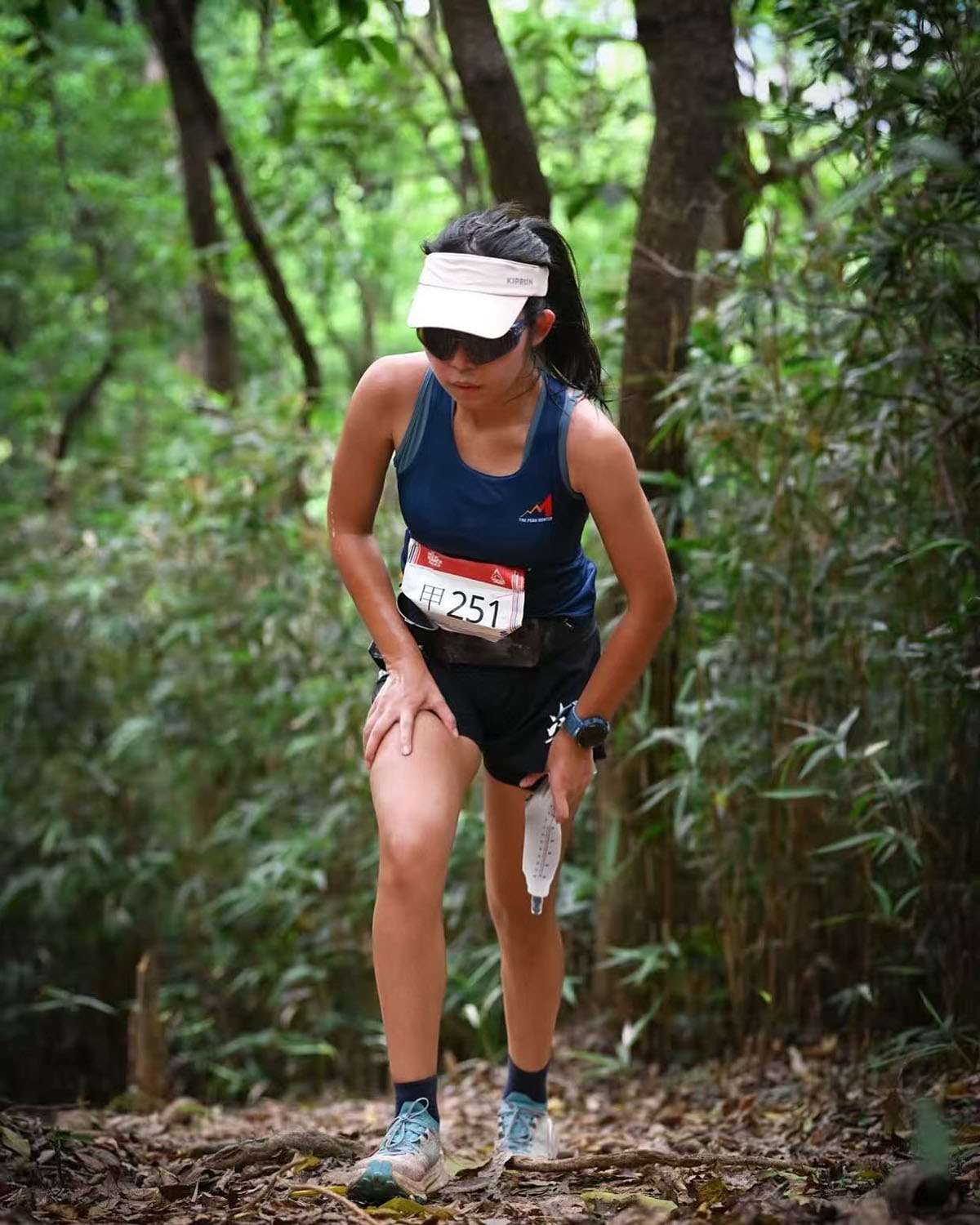Some young students are striving for stellar performance in sports as a gateway to unhindered admission to Hong Kong universities. But the odds of success are slim, with data pointing to such expectations as a ‘mirage’. Lu Wanqing reports.

As her college examination-fixated classmates zeroed in on achieving high grades, Zheng Yan-ki, 18, split a chunk of her energy with seeking a “foolproof pathway” that could potentially land her a scholarship for her dream college program.
Zheng — a stellar academic performer — started her 21-month countdown to the Hong Kong Diploma of Secondary Education (HKDSE) exam last year by improving her sports skills after watching a video of Chloe Pak Hoi-man — the city’s record-holder for the 100-meter hurdles in the U18 and U20 categories.
Pak had sprinted into the University of Hong Kong’s (HKU) prestigious medical program via the institution’s Top Athletes Direct Admission Scheme (TADAS). Her feat threw Zheng into a year-long “all-consuming whirlwind” — attending classes until 5:30 pm each day before track training and then heading to a tutorial center in the city’s Central district after dusk.
The high school senior is betting big on her sports credentials to obtain academic concessions under the Chinese University of Hong Kong’s (CUHK) computer science program by January next year, and secure her future three months ahead of the HKDSE.
READ MORE: Over 15,000 students secure university spots in HK
But what she fails to grasp is a glaring reality projected by educators and sports bodies that athletic prowess is neither an academic shortcut nor an easier route to elite higher educational institutions. Rather, the odds of success are notoriously long.
University figures show that over the past four academic years, starting from 2022-23, CUHK has admitted fewer than 200 students with exceptional athletic performance through “special pathways”. They include only 39 who were accepted under the Student-Athlete Learning Support and Admission Scheme (SALSA Scheme) — a no-exam passage offered by the University Grants Committee (UGC) to all the eight publicly-funded universities in the Hong Kong Special Administrative Region.
In the same period, another 160 students were admitted to CUHK with less stringent academic requirements through the school’s sports scholarship program.
On the whole, in the absence of a public university entrance tally of student-athletes, the data tabulated by analysts paint admissions based on athletic performance with all academic requirements waived as a “mirage”.

Competitive landscape
According to Ian Tsang — a veteran Hong Kong education consultant with 15 years in the field — there is an open pool of more than 1,000 potential candidates every year with tight success rates as most of the city’s 80 sports associations cultivate their own annual training squads, each having 10 to 30 athletes. For a mass sport like athletics, the squads are even larger.
Data from the UGC indicate that about 230 SALSA Scheme-backed student-athletes were studying in public university undergraduate programs in the 2024-25 school year.
Swimmer Cindy Cheung Sum-yuet, who was admitted to HKU last year through TADAS, says competition is intense. “There were more than 200 of us from the Hong Kong swimming team of my age group. But, the number of those who can actually make it to university through sports can be counted with one hand.”
Hong Kong educational institutions’ embrace of lowering admission qualifications for student-athletes has evolved over decades — beginning with HKU’s pioneering sports scholarships in 1995, followed by the Hong Kong Polytechnic University in 1998 and CUHK in 2001, among others.
The system’s ultimate concession — a full academic waiver for student-athletes — came during the 2022-23 academic year, when the SALSA Scheme was launched at publicly-funded universities, followed by similar separate initiatives by schools, solidifying the grade-free pathway for elite athletes.
The logic behind educational institutions lowering admission scores for student-athletes, explains Bennett Yim Chi-kin, HKU’s director of undergraduate admissions, is to extend support for their balanced investment in schoolwork and sports.
The academic bar for student-athlete admissions is calibrated pragmatically at a manageable level, requiring students to demonstrate their capability to complete their degrees, and freeing them to excel in sports, as opposed to the inflated grades demanded by standard admission procedures, he says.
However, as Hong Kong’s conventional examination-to-university system is increasingly being turned into a “pressure cooker of competition”, more families are seeking every possible means to bypass the higher academic bars, says Tsang. And, for many students, sports, alongside many other pursuits, are shifting from being an extracurricular passion to a strategic pathway for university entry.
One key step along the path is to obtain the necessary sports credentials, and Zheng understands the extreme selection process of direct university admissions.
Universities agree that direct admission programs like the SALSA Scheme, in essence, tilt the board in favor of elite athletes recognized by Hong Kong’s accredited sports associations with a high Elite Athletes Support Scheme score — mostly earned by medals or top-tier rankings at prestigious international competitions like the Olympics or the Asian Games.
But, she believes that the benchmarks for a conditional admission offer through various university-specific sports scholarship programs are more within reach, with notable performance in local or inter-school competitions being taken into consideration, as stated on university websites.
Tsang says that as rivalry has heated up over the years, the minimum condition for securing scholarships has been raised to at least having represented Hong Kong in regional or international competitions.
Zheng, with a background in trail running, initially picked athletics. Her goal had been to join association-affiliated training squads and vie for the right to represent the SAR on the national or international stage. Her first-hand experience, however, soon revealed a counterintuitive truth and pushed her to make a detour from athletics — a mass sport — to orienteering — a comparatively lesser-known field.
In athletics, Zheng found herself ranked around sixth place in the women’s 3,000-meter steeplechase — a respectable performance — but, in the crowded field, it is a ticket to nowhere. This is because competitors in a mass sport like athletics fracture into myriad narrow subdisciplines, often with only the top performer in each being able to don the city’s jersey.
Orienteering, on the other hand, presented improved odds, with up to a dozen spots in the Hong Kong team up for grabs for every age group and no subdisciplines to compound the challenge.
The leaders of non-Olympic sports associations have observed this pivot in mindset, with a growing number of young cohorts enquiring about representation opportunities and key certifications for their university applications before committing themselves to any training.
Universities have shown no favoritism for any single sport, but Yim says HKU has seen a notable influx of student fencers and windsurfers.
The Hong Kong University of Science and Technology says fencing and sailing have been the most prominent sports among its student-athletes admitted in the past few years.
At CUHK, track and field athletes and swimmers topped the list for sports scholarship admissions from the 2022-23 to the 2025-26 academic years, with 27 and 21 athletes, respectively, out of the 160 recipients, while athletes and martial arts performers led the school’s SALSA roster, with 13 and five admissions, respectively, out of 39 recipients.
But, the range of sports is veritably vast, with CUHK alone reported to have admitted virtuosos of 40 disciplines, including karting, dancesport, handball, tchoukball and lifesaving.
The perception gaps run deeper from the sports disciplines of successful bidders to their chosen fields of study. Although universities tout largely unrestricted major choices for student-athletes, the actual degrees selected by applicants are often look-alikes. Most student-athletes gravitate towards sports-related degrees, partly drawn by their even lower entry requirements and, supposedly, plain-sailing pathway to graduation, says Tsang.
He says the hosting of world-renowned sports-focused and sports-related degree programs underpins the greater appeal of institutions like CUHK and Hong Kong Baptist University among student-athletes. Data from CUHK for the 2022-26 school years offer clear evidence of students’ preferences. Nearly one-third of the university’s sports scholarship recipients opted for five-year bachelor’s degrees in physical education, exercise science and health.
At HKU, without dedicated sports-linked majors, student-athletes’ choices drift to business and social science, says Yim.
Academic trade-offs
Zheng says her long-term pursuit of sports will remain an amateur’s enthusiasm, as opposed to a professional’s single-minded resolve.
But, Tsang says for students with academic prowess or career ambitions outside sports, being a student-athlete at university means a drawn-out academic journey and often proves more crippling than helpful.
He notes that some local universities explicitly cap student-athletes at just six credits per semester — half the standard academic load — keeping them at a pace that stretches an undergraduate degree to eight to 10 years. Universities see these extended study timelines as part of a broader policy suite designed to accommodate elite sports trainings and competitions, along with measures like flexible attendance, dedicated tutoring and digital learning support.
Jennifer Chiu Chun-chiu, an assistant registrar at CUHK’s Registration and Examination Section, says that data show most student-athletes’ academic results span a “satisfactory” spectrum, from grade-point averages of 2.0 to 3.3, with 4.0 corresponding to the highest grade of “excellent” at CUHK.
It is student-athletes’ well-cultivated discipline, tenacity and punctuality that universities hope will have a positive ripple effect on campus and, ultimately, the workplaces they join, says Elean Leung Fung-lin, director of the Physical Education Unit at CUHK.
She says alumni from CUHK’s two-year exercise science program are increasingly valued in public services, with some having joined the police force.
As a more valuable outcome of dedicated student-athlete admission systems, schools point to retired elite athletes using such programs for senior-year entry to pursue their long-deferred degrees.
Among them is 28-year-old Rafeek Kikabhoy— a retired windsurfer who was admitted to HKU along with Cheung via the TADAS program to study business administration and lay the groundwork for his sports-commerce ambitions.
Even in retirement, his hard-won experience has been flowing back into the school’s sporting sphere, with him becoming a part-time windsurfing trainer and a school team member in new disciplines that mirror the thrill of windsurfing.
Reflecting on his sporting career, the former World Games medalist’s voice is warm, but edged with steel. “As much as I loved it, it was tougher than I imagined,” he says.
Zheng has tasted the bitter side of sports. In June, a misstep during a selection trial cost her the final opportunity before next year’s DSE examination to join the city’s orienteering team in a national competition.
ALSO READ: CUHK opens new fitness center with smart devices to help athletes
Her coach said there might still be chances for Zheng to represent the SAR in smaller regional competitions later this year in which she had placed her hopes.
But, three months later, with the Hong Kong team’s selection process still stalled, Zheng decided to make her own move. On Sept 7, she entered the 5th Thailand International Orienteering Championships World Ranking Events as an independent competitor. At the finish — flushed, breathless, her hair plastered to her skin — she framed the moment in a selfie, satisfied with the performance.
It was her best result in a year engulfed by the sport — ranking 36th in an international event — but the conviction this would ensure her academic future has dimmed. “It may just look impressive,” she concedes.
After poring over sports scholarship rules, robust athletic talent has become, in her eyes, just a bright streak of color for her university application and no more. It is only a glimmer of hope, not the key to the gate.
Contact the writer at wanqing@chinadailyhk.com



